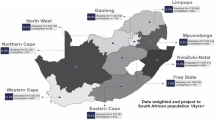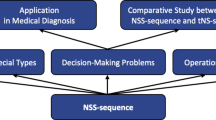Abstract
Multiple personality disorder (MPD) or dissociative identity disorder is the mental disease in which one can observe the existence of two or more than two personalities in a single person. We define the controversies nearby the diagnosis of MPD with its associated mental disorders. We discuss the various symptoms of MPD, dissociative amnesia, depersonalization or derealization disorder, and major depression disorder. After this exploration, we perceive that these disorders enclose parallel symptoms and it is difficult to identify the accurate type of disorder with its severeness. Since in experimental diagnosis the indeterminacy and falsity parts are often neglected. Due to this problem, we cannot see the accuracy in the patient’s improvement record and cannot predict the duration of treatment. To eradicate these boundaries, we present the m-polar neutrosophic soft set (MPNSS) and m-polar neutrosophic soft mapping (MPNS-mapping) with its inverse mapping. These notions are proficient and valuable to diagnose the disorder appropriately by connecting it with the mathematical modeling. The connection of m-polar neutrosophic set (MPNS) with the soft set characterizes a relation among patients, symptoms, and treatments which decreases the complexity of the case study. We build a chart based on a fuzzy interval [0, 1] to range the types of disorders. We establish an algorithm based on MPNS-mapping to identify the disease appropriately and to select the finest treatment for the corresponding disease of every patient. At last, we introduce the generalized MPNS-mapping which will helps a doctor to save the patient’s improvement record and to predict the period of treatment until the disease is cured.









Similar content being viewed by others
Explore related subjects
Discover the latest articles, news and stories from top researchers in related subjects.References
Ali MI (2018) Another view on q-rung orthopair fuzzy sets. Int J Intell Syst 33:2139–2153
Ali MI, Shabir M (2014) Logic connectives for soft sets and fuzzy soft sets. IEEE Trans Fuzzy Syst 22:1431–1442
Ali MI, Feng F, Liu XY, Min WK, Shabir M (2009) On some new operations in soft set theory. Comput Math Appl 57:1547–1553
Allen JJ, Movius HL II (2000) The objective assesment of amnesia in dissociative identity disorder using event-related potentials. Int J Psychophysiol 1:21–41
Alonso J et al (2011) Days out of role due to common physical and mental conditions: results from the WHO world mental surveys. Mol Psychiatr 16:1234–1246
Ashraf A, Krishnan R, Wudneh E, Acharya A, Tohid H (2016) Dissociative identity disorder: a pathophysiological phenomenon. J Cell Sci Ther 7(251):10. https://doi.org/10.4172/2157-7013.1000251
Atanassov KY, Stoeva S (1983) Intuitionistic fuzzy sets. In: Polish symposium on interval fuzzy mathematics, Poznan, pp 23–26
Atanassov KT (1984) Intuitionistic fuzzy sets. In: Sgurev V (ed) VII ITKRs session, Sofia, June 1983. Central Science and Technology Library, Bulgarian Academy of Sciences
Atanassov KT (1986) Intuitionistic fuzzy sets. Fuzzy Sets Syst 20(1):87–96
Bahrami MA, Bahrami D, Chaman-Ara K (2019) The correlations of mental health literacy with psychological aspects of general health among Iranian female students. Int J Ment Health Syst 13(59):1–7
Bashir M, Salleh AR (2013) Mappings on intuitionistic fuzzy soft classes. In: AIP conference proceedings, pp 15–22
Çağman N, Enginoglu S, Çitak F (2011) Fuzzy soft set theory and its applications. Iran J Fuzzy Syst 8(8):137–147
Chen SM, Tan MJ (1994) Handling multicriteria fuzzy decision-makling problems based on vague set theory. Fuzzy Sets Syst 67:163–172
Chen J, Li S, Ma S, Wang X (2014) m-polar fuzzy sets: an extension of bipolar fuzzy sets. Sci World J 10:10. https://doi.org/10.1155/2014/416530
Christianto V, Smarandache F (2019) A review of seven applications of neutrosophic logic: in cultural psychology, economics theorizing, conflict resolution, philosophy of science, etc. Multidiscip Sci J 2(2):128–137. https://doi.org/10.3390/j2020010
Deli I, Ali M, Smarandache F (2015) Bipolar neutrosophic sets and their application based on multi-criteria decision-making problems. In: Proceedings of 2015 international conference on advanced mechatronic systems. Beijing, China
Demirci M (1999) Fuzzy functions and their fundamental properties. Fuzzy Sets Syst 106(2):239–246
Farahani H, Smarandache F, Wang LL (2015) A comparison of combined overlap block fuzzy cognitive maps (COBFCM) and combined overlap block neutrosophic cognitive map (COBNCM) in finding the hidden patterns and indeterminacies in psychological causal models: case study of ADHD, “critical review”, Center for Mathematics of Uncertainty, Creighton University, Omaha, NE, USA, vol X, pp 70–84
Feng F, Jun YB, Liu X, Li L (2010) An adjustable approach to fuzzy soft set based decision making. J Comput Appl Math 234(1):10–20
Feng F, Fujita H, Ali MI, Yager RR, Liu X (2019) Another view on generalized intuitionistic fuzzy soft sets and related multi-attribute decision-making methods. IEEE Trans Fuzzy Syst 27(3):474–488
Hashmi MR, Riaz M (2020) A novel approach to censuses process by using pythagorean m-polar fuzzy Dombi’s aggregation operator. J Intell Fuzzy Syst 38(2):1977–1995
Hashmi MR, Riaz M, Smarandache F (2020) m-polar neutrosophic topology with applications to multi-criteria decision-making in medical diagnosis and clustering analysis. Int J Fuzzy Syst 22(1):273–292
Innocent PR, Jhon RI (2004) Computer aided fuzzy medical diagnosis. Inf Sci 162(2):81–104
Jiang H, Zhan J, Sun B, Alcantud JCR (2020) An MADM approach to covering-based variable precision fuzzy rough sets: an application to medical diagnosis. Int J Mach Learn Cyber 11:2181–2207
Jose S, Kuriaskose S (2014) Aggregation operators, score function and accuracy function for multi criteria decision making in intuitionistic fuzzy context. Notes Intuit Fuzzy Sets 20(1):40–44
Kharal A, Ahmad B (2009) Mappings on fuzzy soft classes. Adv Fuzzy Syst 2009:4–5
Kharal A, Ahmad B (2011) Mappings on soft classes. New Math Nat Comput 7(3):471–482
Kovalerchukab B, Triantaphyllouab E, Fuizc JF, Claytond J (1997) Fuzzy logic in computer-aided breast cancer diagnosis: analysis of lobulation. Artif Intell Med 11(1):75–85
Lakdawala BM, Vankar GK (2016) A study on community attitudes towards the mentally ill among youth in Gujrat. Indian J Ment Health 3(4):473–485
Maji PK, Biswas R, Roy AR (2003) Soft set theory. Comput Math Appl 45:555–562
Majumdar P, Samanta SK (2010) On soft mappings. Comput Math Appl 60(9):2666–2672
Molodtsov D (1999) Soft set theory-first results. Comput Math Appl 37:19–31
Morton J (2018) Autonoesis and dissociative identity disorder. Behav Brain Sci. https://doi.org/10.1017/S0140525X17001558
Mu X, Zhan J, Sun B, Alcantud JCR (2020) Novel classes of coverings based multi-granulation fuzzy rough sets and corresponding applications to multiple attribute group decision-making. Artif Intell Rev. https://doi.org/10.1007/s10462-020-09846-1
Nissen MJ, Ross JL, Willingham DB et al (1988) Memory and awareness in a patient with multiple personality disorder. Brain Cogn 8:17–134
Noor AA, Yazdi SAB, Hafezi M (2012) Trends in change of mental health status in the population of Tehran between 1998 and 2007. Arch Iran Med 15(4):201–204
Riaz M, Hashmi MR (2018) Fixed points of fuzzy neutrosophic soft mapping with decision-making. Fixed Point Theory Appl 7:1–10
Riaz M, Hashmi MR (2019) Linear Diophantine fuzzy set and its applications towards multi-attribute decision making problems. J Intell Fuzzy Syst 37(4):5417–5439
Riaz M, Hashmi MR (2019) Soft rough Pythagorean m-polar fuzzy sets and Pythagorean m-polar soft rough fuzzy sets with application to decision-making. Comput Appl Math 39(1):1–36
Riaz M, Hashmi MR (2019) MAGDM for agribusiness in the environment of various cubic m-polar fuzzy averaging aggregation operators. J Intell Fuzzy Syst 37(3):3671–3691
Riaz M, Naeem K (2016) Measurable soft mappings. Punjab Univ J Math 48(2):19–34
Riaz M, Tehrim ST (2019) Bipolar fuzzy soft mappings with application to bipolar disorder. Int J Biomath 12(7):1–31
Riaz M, Tehrim ST (2020) Cubic bipolar fuzzy set with application to multi-criteria group decision making using geometric aggregation operators. Soft Comput. https://doi.org/10.1007/s00500-020-04927-3
Riaz M, Tehrim ST (2020) A robust extension of VIKOR method for bipolar fuzzy sets using connection numbers of SPA theory based metric spaces. Artif Intell Rev. https://doi.org/10.1007/s10462-020-09859-w
Rutkofsky IH, Kahn AS, Sahito S, Aqeel N, Tohid H (2017) The neuropsychiatry of dissociative identity disorder: why split personality patients switch personalities intermittently? J Cell Sci Ther 8(2):1–8
Sayarifard A, Ghadirian L (2013) Mental health literacy in Iran: an urgent need for a remedy. Int J Prev Med 4(7):741–742
Shen YH, Wang FX, Chen W (2012) A note on intuitionistic fuzzy mappings. Iran J Fuzzy Syst 9(5):63–76
Smarandache F (2018) Neutropsychic personality, Pons asbl, Belgium, first edition 118 pages, 2018; second enlarged edition, 131 p. 2018; third updated edition, 131 pages. http://fs.unm.edu/NeutropsychicPersonality-ed3.pdf
Smarandache F (1998) Neutrosophy neutrosophic probability, set and logic. American Research Press, Rehoboth
Tversky A, Kahneman D (1992) Advances in prospect theory: cumulative representation of uncertainity. J Risk Uncertain 5:297–323
Wang H, Smarandache F, Zhang YQ, Sunderraman R (2010) Single valued neutrosophic sets. Multispace Multistruct 4:410–413
Yager RR (2013) Pythagorean fuzzy subsets. IFSA world congress and NAFIPS annual meeting (IFSA/NAFIPS), 2013 Joint, Edmonton, Canada, IEEE, pp 57–61
Yager RR (2014) Pythagorean membership grades in multi criteria decision-making. IEEE Trans Fuzzy Syst 22:958–965
Yager RR (2017) Generalized orthopair fuzzy sets. IEEE Trans Fuzzy Syst 25:1222–1230
Yager RR, Abbasov AM (2013) Pythagorean membership grades, complex numbers, and decision making. Int J Intell Syst 28(5):436–452
Zadeh LA (1965) Fuzzy sets. Inf Control 8:338–353
Zadeh LA (1975) The concept of a linguistic variable and its application to approximate reasoning-I. Inf Sci 8(3):199–249
Zhan J, Alcantud JCR (2019) A novel type of soft rough covering and its application to multi-criteria group decision making. Artif Intell Rev 52:2381–2410
Zhan J, Alcantud JCR (2019) A survey of parameter reduction of soft sets and corresponding algorithms. Artif Intell Rev 52:1839–1872
Zhan J, Wang Q (2019) Certain types of soft coverings based rough sets with applications. Int J Mach Learn Cyber 10:1065–1076
Zhan J, Sun B, Zhang X (2020) PF-TOPSIS method based on CPFRS models: an application to unconventional emergency events. Comput Ind Eng 139:106–192
Zhang WR (1994) Bipolar fuzzy sets and relations: A computational framework for cognitive modeling and multi-agent decision analysis. In: Proceedings of IEEE conference (San Antonio, TX, USA, 1994), pp 305–309
Zhang WR (1998) (Yin Yang), bipolar fuzzy sets. In: Proceedings of the IEEE world congress on computational intelligence-Fuzz-IEEE, Anchorage, AK, May 22, pp 835–840
Zhang L, Zhan J (2019) Fuzzy soft \(\beta\)-covering based fuzzy rough sets and corresponding decision-making applications. Int J Mach Learn Cyber 10:1487–1502
Zhang WR, Zhang L (2004) Yin Yang bipolar logic and bipolar fuzzy logic. Inf Sci 165(3–4):265–287
Zhang L, Zhan J, Yao Y (2020) Intuitionistic fuzzy TOPSIS method based on CVPIFRS models: an application to biomedical problems. Inf Sci 517:315–339
Author information
Authors and Affiliations
Corresponding author
Additional information
Publisher's Note
Springer Nature remains neutral with regard to jurisdictional claims in published maps and institutional affiliations.
Rights and permissions
About this article
Cite this article
Riaz, M., Hashmi, M.R. m-polar neutrosophic soft mapping with application to multiple personality disorder and its associated mental disorders. Artif Intell Rev 54, 2717–2763 (2021). https://doi.org/10.1007/s10462-020-09912-8
Published:
Issue Date:
DOI: https://doi.org/10.1007/s10462-020-09912-8







